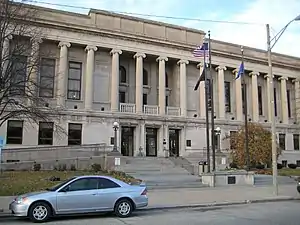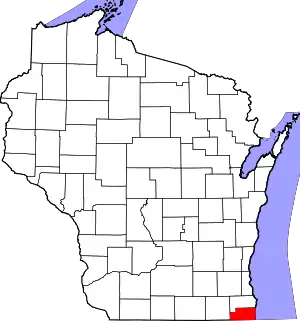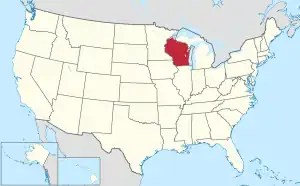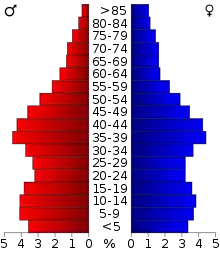Kenosha County, Wisconsin
Kenosha County is located in the southeastern corner of the U.S. state of Wisconsin. The population was 169,151 as of the 2020 census, making it the eighth most populous county in Wisconsin.[1][2] The county shares the same name as the city of Kenosha,[3] the fourth largest city in Wisconsin.[1] Kenosha County is part of the Chicago metropolitan area, the fourth most-populous metropolitan area in North America. Kenosha County is situated on the southwestern shore of Lake Michigan.
Kenosha County | |
|---|---|
 | |
 Location within the U.S. state of Wisconsin | |
 Wisconsin's location within the U.S. | |
| Coordinates: 42°34′22″N 87°50′23″W | |
| Country | |
| State | |
| Founded | January 30, 1850 |
| Seat | Kenosha |
| Largest city | Kenosha |
| Area | |
| • Total | 754 sq mi (1,950 km2) |
| • Land | 272 sq mi (700 km2) |
| • Water | 482 sq mi (1,250 km2) 64% |
| Population (2020) | |
| • Total | 169,151 |
| • Density | 224.3/sq mi (86.6/km2) |
| Time zone | UTC−6 (Central) |
| • Summer (DST) | UTC−5 (CDT) |
| Congressional district | 1st |
| Website | www |
The county has a direct rail link to Chicago via Metra's Union Pacific / North Line. Since 2000, the county saw a population increase of 12.6%, higher than the overall Wisconsin growth of 6.0%.[4] According to Business Insider, Kenosha County is an exurb and benefits as part of the Chicago metropolitan area.[5] In 2022, Kenosha County was ranked 16th out of 72 Wisconsin counties for tourism revenue, at $424 million in 2022; a 13.6% increase over 2021. Kenosha County's previous record level was in 2019 at $391 million.[6]
History
The Potowatomi inhabited the area that would become Kenosha County for centuries prior to the acquisition of the area in 1833. The city of Kenosha was founded in 1835, and Kenosha County was formed from Racine County on January 30, 1850.[7] Its location led to development and factories being built in the 19th century. Manufacturing continued to be a key component of the economy into the 20th century.[8]
Geography
According to the U.S. Census Bureau, the county has a total area of 754 square miles (1,950 km2), of which 272 square miles (700 km2) is land and 482 square miles (1,250 km2) (64%) is water.[9] Although the county contains area from Lake Michigan, it is the fourth-smallest county in Wisconsin by land area.[10]
Major highways
Airport
Kenosha Regional Airport (KENW) serves the county and surrounding communities.
Adjacent counties
- Racine County (north)
- Allegan County, Michigan (east)
- Lake County, Illinois (south)
- McHenry County, Illinois (southwest)
- Walworth County (west)
Demographics
| Census | Pop. | Note | %± |
|---|---|---|---|
| 1850 | 10,734 | — | |
| 1860 | 13,900 | 29.5% | |
| 1870 | 13,147 | −5.4% | |
| 1880 | 13,550 | 3.1% | |
| 1890 | 15,581 | 15.0% | |
| 1900 | 21,707 | 39.3% | |
| 1910 | 32,929 | 51.7% | |
| 1920 | 51,284 | 55.7% | |
| 1930 | 63,277 | 23.4% | |
| 1940 | 63,505 | 0.4% | |
| 1950 | 75,238 | 18.5% | |
| 1960 | 100,615 | 33.7% | |
| 1970 | 117,917 | 17.2% | |
| 1980 | 123,137 | 4.4% | |
| 1990 | 128,181 | 4.1% | |
| 2000 | 149,577 | 16.7% | |
| 2010 | 166,426 | 11.3% | |
| 2020 | 169,151 | 1.6% | |
| U.S. Decennial Census[11] 1790–1960[12] 1900–1990[13] 1990–2000[14] 2010–2020[15] 2020 census[2] | |||

As of the census[16] of 2000, there were 149,577 people, 56,057 households, and 38,455 families residing in the county. The population density was 548 people per square mile (212 people/km2). There were 59,989 housing units at an average density of 220 units per square mile (85 units/km2). The racial makeup of the county was 88.38% White, 5.08% Black or African American, 0.38% Native American, 0.92% Asian, 0.04% Pacific Islander, 3.29% from other races, and 1.91% from two or more races. 7.19% of the population were Hispanic or Latino of any race. 28.8% were of German, 10.4% Italian, 7.9% Irish, 7.6% Polish and 7.5% English ancestry.
There were 56,057 households, out of which 34.80% had children under the age of 18 living with them, 52.70% were married couples living together, 11.50% had a female householder with no husband present, and 31.40% were non-families. 25.50% of all households were made up of individuals, and 9.10% had someone living alone who was 65 years of age or older. The average household size was 2.60 and the average family size was 3.13.
In the county, the population was spread out, with 27.10% under the age of 18, 9.40% from 18 to 24, 31.30% from 25 to 44, 20.70% from 45 to 64, and 11.50% who were 65 years of age or older. The median age was 35 years. For every 100 females, there were 98.30 males. For every 100 females age 18 and over, there were 95.30 males.
In 2017, there were 1,873 births, giving a general fertility rate of 55.7 births per 1000 women aged 15–44, the 13th lowest rate out of all 72 Wisconsin counties.[17]
Government
The county legislature is known as the Board of Supervisors. It consists of 23 members, each elected from single-member districts. The county executive is elected in a spring countywide, nonpartisan vote. The county executive is Samantha Kerkman. The district attorney, treasurer, clerk, and register of deeds are elected in fall countywide, partisan elections held in presidential years, while the sheriff and clerk of circuit court are elected in fall countywide, partisan elections held in gubernatorial years.
Politics
In presidential elections, Kenosha County has voted Democratic for most of the past century. In 2016, Donald Trump became the first Republican presidential candidate to win the county since President Nixon in 1972. Trump won it again in 2020, this time with an outright majority of the vote, marking the first consecutive victories for the GOP in Kenosha County since 1928.
| Year | Republican | Democratic | Third party | |||
|---|---|---|---|---|---|---|
| No. | % | No. | % | No. | % | |
| 2020 | 44,972 | 50.68% | 42,193 | 47.55% | 1,573 | 1.77% |
| 2016 | 36,037 | 47.23% | 35,799 | 46.92% | 4,468 | 5.86% |
| 2012 | 34,977 | 43.24% | 44,867 | 55.46% | 1,053 | 1.30% |
| 2008 | 31,609 | 40.12% | 45,836 | 58.18% | 1,344 | 1.71% |
| 2004 | 35,587 | 46.56% | 40,107 | 52.48% | 734 | 0.96% |
| 2000 | 28,891 | 45.35% | 32,429 | 50.90% | 2,389 | 3.75% |
| 1996 | 18,296 | 34.06% | 27,964 | 52.06% | 7,457 | 13.88% |
| 1992 | 19,854 | 32.11% | 27,341 | 44.21% | 14,642 | 23.68% |
| 1988 | 21,661 | 41.55% | 30,089 | 57.72% | 379 | 0.73% |
| 1984 | 26,118 | 46.89% | 29,233 | 52.49% | 344 | 0.62% |
| 1980 | 24,481 | 43.82% | 26,738 | 47.86% | 4,644 | 8.31% |
| 1976 | 22,349 | 43.61% | 27,585 | 53.82% | 1,316 | 2.57% |
| 1972 | 24,041 | 53.93% | 19,441 | 43.61% | 1,094 | 2.45% |
| 1968 | 17,089 | 40.57% | 21,427 | 50.86% | 3,610 | 8.57% |
| 1964 | 14,764 | 32.55% | 30,522 | 67.29% | 70 | 0.15% |
| 1960 | 19,969 | 46.43% | 22,956 | 53.37% | 86 | 0.20% |
| 1956 | 21,367 | 55.08% | 17,094 | 44.06% | 335 | 0.86% |
| 1952 | 18,917 | 48.72% | 19,768 | 50.91% | 142 | 0.37% |
| 1948 | 12,780 | 39.80% | 17,987 | 56.02% | 1,342 | 4.18% |
| 1944 | 12,436 | 39.96% | 18,325 | 58.88% | 360 | 1.16% |
| 1940 | 12,182 | 40.91% | 17,174 | 57.68% | 421 | 1.41% |
| 1936 | 7,268 | 26.68% | 18,137 | 66.57% | 1,840 | 6.75% |
| 1932 | 7,307 | 30.57% | 14,373 | 60.13% | 2,223 | 9.30% |
| 1928 | 11,330 | 50.66% | 10,638 | 47.57% | 395 | 1.77% |
| 1924 | 10,341 | 55.45% | 1,517 | 8.13% | 6,791 | 36.41% |
| 1920 | 9,791 | 77.81% | 1,724 | 13.70% | 1,069 | 8.49% |
| 1916 | 3,537 | 50.99% | 2,813 | 40.55% | 587 | 8.46% |
| 1912 | 1,671 | 27.21% | 2,216 | 36.09% | 2,254 | 36.70% |
| 1908 | 3,409 | 54.50% | 2,006 | 32.07% | 840 | 13.43% |
| 1904 | 3,293 | 60.86% | 1,592 | 29.42% | 526 | 9.72% |
| 1900 | 3,078 | 58.37% | 2,101 | 39.84% | 94 | 1.78% |
| 1896 | 2,827 | 60.54% | 1,732 | 37.09% | 111 | 2.38% |
| 1892 | 1,628 | 44.71% | 1,928 | 52.95% | 85 | 2.33% |
Communities
City
- Kenosha (county seat)
Villages
Census-designated places
Unincorporated communities
Ghost towns/neighborhoods
Notes
- "Demographic Services Center 2021 Population Estimates: Wisconsin's Moderate Growth Continues" (PDF). Wisconsin Department of Administration. Archived (PDF) from the original on October 9, 2022. Retrieved April 27, 2022.
- "QuickFacts Kenosha County, Wisconsin; United States". census.gov. Retrieved August 16, 2021.
- "Here's How Iron Got Its Name". The Rhinelander Daily News. June 16, 1932. p. 2. Archived from the original on September 3, 2014. Retrieved August 24, 2014 – via Newspapers.com.

- "Kenosha County is growing". kaba.org. Kenosha Area Business Alliance. Retrieved February 22, 2021.
- Winck, Ben (August 1, 2021). "Forget the suburbs, the 'exurbs' are the place to be". businessinsider.com. Business Insider. Retrieved August 2, 2021.
- "Record-Breaking Year for Kenosha County Tourism in 2022". Kenosha News. June 6, 2023. Retrieved June 8, 2023.
- "Kenosha County". Encyclopedia of Milwaukee. University of Wisconsin–Milwaukee. Retrieved April 27, 2022.
- WHS Library Archives Staff (August 16, 2012). "A Brief History of Kenosha, Wisconsin". Wisconsin Historical Society. Archived from the original on March 25, 2018. Retrieved March 25, 2018.
- "2010 Census Gazetteer Files". United States Census Bureau. August 22, 2012. Archived from the original on September 4, 2015. Retrieved August 5, 2015.
- "U.S. Census Bureau QuickFacts: Kenosha County, Wisconsin". www.census.gov. Retrieved May 13, 2020.
- "U.S. Decennial Census". United States Census Bureau. Retrieved August 5, 2015.
- "Historical Census Browser". University of Virginia Library. Archived from the original on August 11, 2012. Retrieved August 5, 2015.
- Forstall, Richard L., ed. (March 27, 1995). "Population of Counties by Decennial Census: 1900 to 1990". United States Census Bureau. Archived from the original on July 18, 2015. Retrieved August 5, 2015.
- "Census 2000 PHC-T-4. Ranking Tables for Counties: 1990 and 2000" (PDF). United States Census Bureau. April 2, 2001. Archived (PDF) from the original on December 18, 2014. Retrieved August 5, 2015.
- "State & County QuickFacts". United States Census Bureau. Archived from the original on July 17, 2011. Retrieved January 21, 2014.
- "U.S. Census website". United States Census Bureau. Retrieved May 14, 2011.
- "Annual Wisconsin Birth and Infant Mortality Report, 2017 P-01161-19 (June 2019): Detailed Tables". Archived from the original on June 19, 2019. Retrieved June 19, 2019.
- Leip, David. "Dave Leip's Atlas of U.S. Presidential Elections". uselectionatlas.org. Archived from the original on March 23, 2018. Retrieved November 11, 2020.
References
- Forstall, Richard L., ed. (1996). Population of States and Counties of the United States: 1790 to 1990: From the Twenty-One Decennial Censuses. Washington, DC: United States Department of Commerce, Bureau of the Census, Population Division. ISBN 0-934213-48-8.
External links
- Official website

- Kenosha County map from the Wisconsin Department of Transportation
